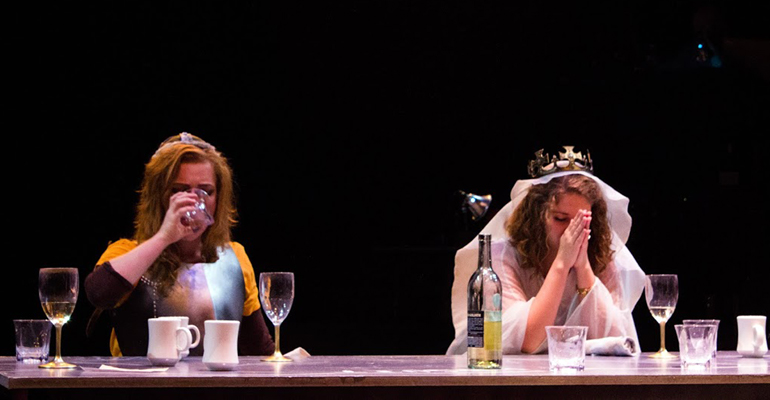Caption: Abbie Cathcart and Moriah Whiteman rehearse scenes for Caryl Churchill’s “Top Girls.” The play, written in 1982, has a prominent theme of feminism that remains relevant in today’s society. Opening night is Thursday.
Women gained the right to vote in the U.S. in 1920. Margaret Thatcher became the first female prime minister of the United Kingdom in 1979. And yet, in 2014, feminism is still a topic being discussed. Noe Cugny/Printz
While many people have their own personal definitions of feminism, the dictionary definition states it is the doctrine advocating social, political and all other rights of women equal to those of men. That means the idea that women can have the same jobs as men, get paid the same as men and have the same life goals as men, a prevalent theme in Caryl Churchill’s “Top Girls.”
The play focuses on Marlene, played by second-year MFA acting student Hillary Lewis. Marlene strived to be a career woman and she had to make sacrifices early in her life to get away from the simple life her parents led so that she could move to a big city and have a career for herself. However, during the play she wondered what her life would have been like if she had tried to start a family.
“She wonders if she could have been that person who could have had it all with a career and a family,” Lewis said. “There are times she has to fight for her career because she feels she earned it.”
The play opens with a dream Marlene has where she eats dinner with women from all throughout history and from different parts of the world, some real and some fictional. All of these women represent parts of Marlene’s life and what she thinks about where she has been and where she is going.
One of the women at the dinner, Isabella Bird, most closely relates to Marlene because she chose not to marry young in life and focused more on bettering herself as an individual. Bird’s character is played by MFA acting student Debra Brown.
“Marlene really relates (to) Isabella because she traveled all over the world in the 1800s while being sick and all of that took a lot of strength,” Brown said. “Isabella also lost her mother and sister early on, so most of her journeys were spent alone.”
The play was written in 1982, just a few years after Thatcher took office, which is a heavy influence on the play.
Some women were inspired by Thatcher and thought they could rise to have a successful career in a male-dominated world. Some saw Thatcher as a perversion, thinking she broke traditional values by not being a doting wife and mother.
This message is very clear in the play as Marlene is often criticized for sacrificing family for her success. She is even at one point called “unnatural” for it.
“I feel this is an important piece because we are still dealing with a lot of these issues today even though the play was written in 1982,” said third year MFA directing student Michelle Taylor. “It’s all about female empowerment and still applies today considering there still isn’t equal pay for the sexes.”
The play opens Oct. 30 and runs again on Oct. 31 and Nov. 1, 4 and 5, each show beginning at 7:30 p.m. A matinee show will also be performed on Nov. 2 at 2 p.m., and all shows are in the Hartwig Theatre.



























